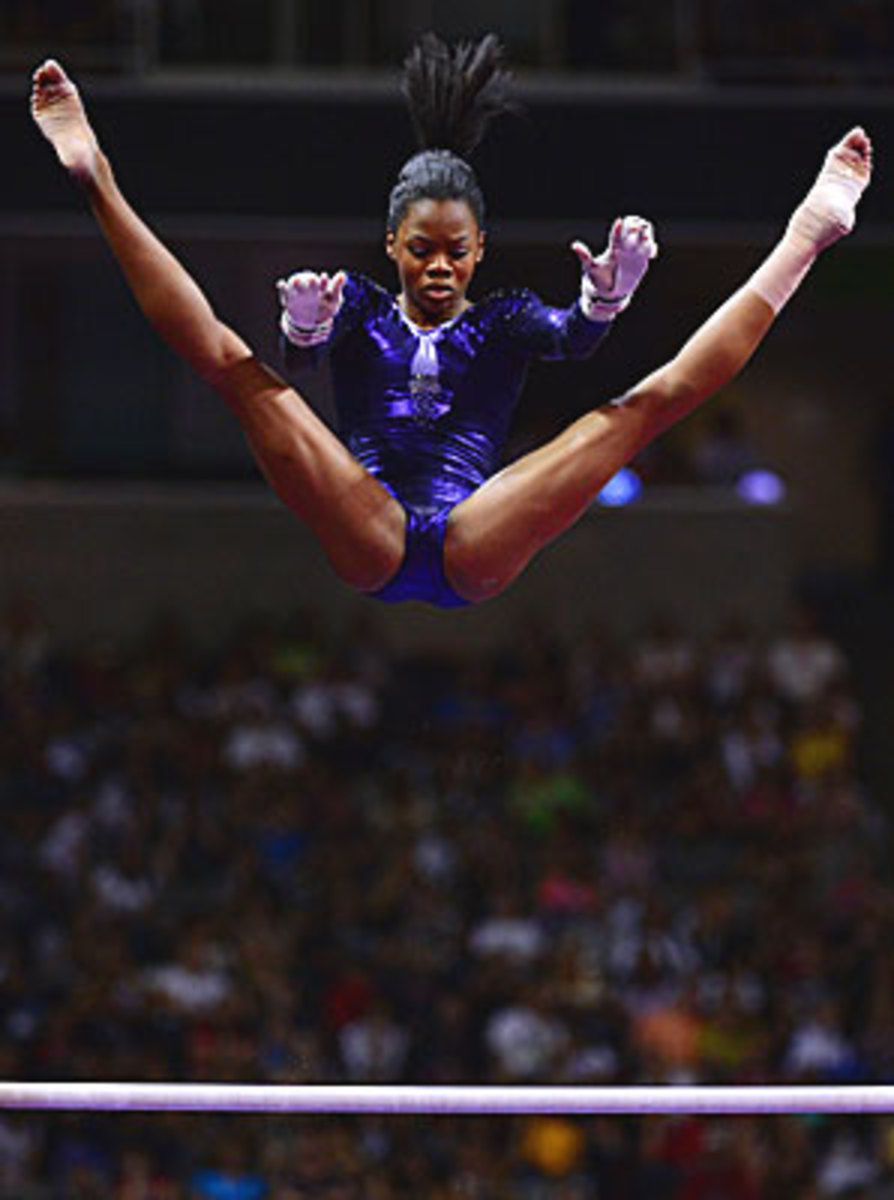
Douglas to lead team of fresh faces after winning gymnastics trials
With that, Douglas ran, tumbled and turned both herself and the gymnastics landscape upside-down. A minute later, she received a 15.300, giving her exactly a tenth of a point more than Jordyn Wieber, the world all-around champion and winner of the national championships in June in St. Louis. Joining them on what is unquestionably the world's top Olympic team will be Aly Raisman, Kyla Ross and McKayla Maroney. But at the top, the U.S. squad now has a No. 1 and a No. 1A. Either Douglas, the so called "flying squirrel" with the higher difficulty, or Wieber, the steady proven winner on the international scene, could bring home all-around gold in London.
Though a member of the U.S. squad that won team gold at the world championships in Tokyo last year, Douglas has only emerged as one of the Olympic favorites over the past few months. "I never expected this," she admitted. "It's pretty dreamy."
Douglas had posted the second-highest all-around score on the first night of competition on Friday night, trailing Wieber by three-tenths of a point. But she built a 1.35 lead after strong scores on her first two events, vault (16.000) and uneven bars (15.900). She wobbled frequently in different spots on the balance beam, but managed to stay on despite a few arm waves. The score of 14.850, left her six-tenths ahead, with Wieber going on vault and Douglas set for floor. Wieber scored 15.800 for a solid, but somewhat low, Amanar vault (a round-off onto the horse and 2 ½ twisting backflip off). Then Douglas stepped up to floor immediately after. The crowd noise had built so much during the early portion of her routine, she said she recalled thinking, "quiet, please, I can't hear my music." On her final pass, she stood up as she told herself and received a 15.300, leaving her a tenth ahead of Wieber.
For the second straight night, Wieber had strong efforts on three of her events. She also hit bars, a usually weak event that she has upgraded with a stronger dismount. For the second straight night she scored 15.300. She also hit a very strong floor routine with four good passes and received 15.600. But on her second event of the evening, she cautiously survived a beam routine that was tentative at best. She didn't come close to falling, but she hesitated between skills on two occasions -- tumbling in and out of standing fulls and connecting two side aerials -- losing valuable bonus points for connections that would have given another three or four tenths. She received just 14.900 for the routine, which had a good 6.300 start value, but received just 8.600 for execution. "I've been pretty tentative on it," she said afterwards. "It hasn't been as strong as I'd like."
Wieber's coach, John Geddert, who is known to have his gymnasts take questionable skills out of routines, said they might have to downgrade before London. "We may have to take some things out," said Geddert, who must balance the potential losses in execution score with the addition to Wieber's difficulty score. "Is the return worth it? We'll see."
First place at the trials does not guarantee Olympic superiority. In 2004, Carly Patterson finished third at the U.S. trials won by Courtney Kupets, but Patterson won the all-around crown in Athens. Four years later Johnson was the U.S. trials champ, but Nastia Liukin claimed all-around gold in Beijing and Johnson won gold on the balance beam. "They are so close," said Liang Chow, Douglas' coach. "I don't think we have just one champion. You know Gabby and Jordyn are both capable of great things in London."
So is the U.S. team. Aly Raisman, who finished third in the all-around competition in San Jose, also earned a berth, as expected. The world bronze medalist on floor has upgraded her difficulty on the event this year and will be among the favorites to win it in London. McKayla Maroney, the world vault champ, did all four events in San Jose, but may only be needed on her best event in London, where she could win it again. Kyla Ross also earned a spot among the first five after posting a strong score of 15,600 on bars, perhaps the team's weakest event. Elizabeth Price, Anna Li and Sarah Finnegan were named as potential replacement athletes.
For all the strong resumes the U.S. team brought to the training gyms at the start of the year -- Liukin, Johnson, Alicia Sacramone, Rebecca Bross, Chellsie Memmel and Bridget Sloan had combined for 48 world and Olympic medals -- none of the tenured old guard made the 2012 team. Liukin, the Olympic all-around champ in Beijing, received a standing ovation after falling off bars, her signature event, earlier in the night, sending her off to retirement fondly. Sacramone performed well on vault and beam, the two events she chose to do in San Jose, but was still not selected.
---
Here is a list of the ten members of the 2012 U.S. Olympic gymnastics team and a guess as to what the lineup in the team finals in London might be for both the men and women.
Danell Leyva
John Orozco
Sam Mikulak
Jonathan Horton
Jake Dalton
Floor: Dalton, Leyva, Orozco
Pommel Horse: Orozco, Leyva, Mikulak
Rings: Horton, Orozco, Dalton
Vault: Mikulak, Dalton, Leyva
Parallel Bars: Leyva, Mikulak, Horton
Horizontal Bar: Leyva, Orozco, Horton
Gabby Douglas
Jordyn Wieber
Aly Raisman
Kyla Ross
McKayla Maroney
Vault: Maroney, Wieber, Douglas
Uneven Bars: Douglas, Ross, Wieber
Balance Beam: Raisman, Wieber, Ross
Floor: Raisman, Wieber, Douglas




